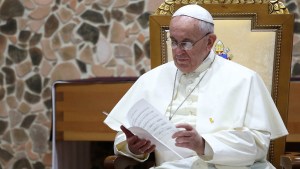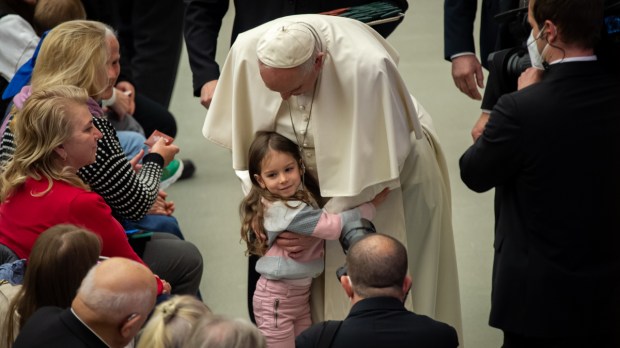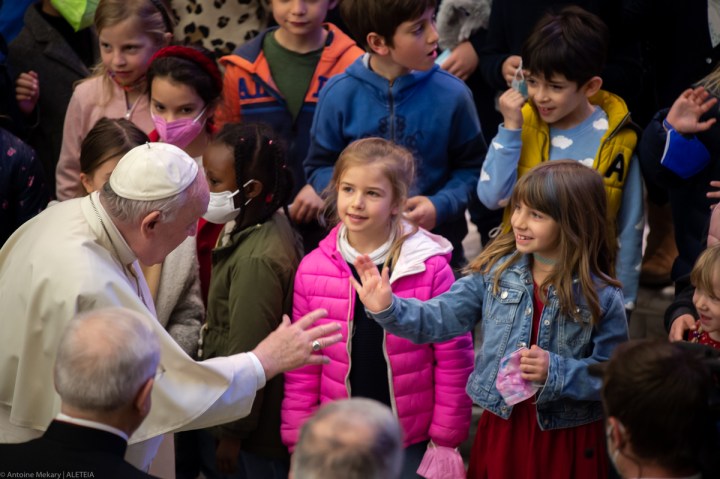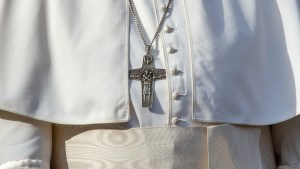Again revealing his love for Fyodor Dostoevsky, Pope Francis reflected at the April 13 general audience about how different Christ’s peace is from that the world offers.
Jesus is not going into a “triumphal Passover,” the Pope said. “The only thing that he is concerned about in the preparation of his entry into Jerusalem is to ride ‘a colt tied, on which no-one has ever yet sat.’ This is how Christ brings peace into the world: through meekness and mildness, symbolized by that tethered colt, on which no-one had ever sat. No-one, because God’s way of doing things is different to that of the world.”
Jesus spells out that his peace is different from the peace of the world (John 14:27), the Holy Father noted. “They are two different approaches: the way the world gives us peace, and the way God gives us peace. They are different.”
The strategy of the world is to seek peace by force and with “various forms of imposition,” he said. “This peace, in reality, is only an interval between wars: We are well aware of this.”
Instead, God’s peace follows the path of meekness and the cross. “It is taking responsibility for others. Indeed, Christ took on himself our evil, sin, and death. He took all of this upon himself. In this way he freed us. He paid for us.”
Thus the peace that God gives is “born of self-giving.” It is a “meek and courageous peace” but is in fact “difficult to accept.”
The world’s logic condemns God
In this regard, a great story by Dostoevsky, the so-called Legend of The Grand Inquisitor, is always relevant. It tells of Jesus who, after several centuries, returns to Earth. He is immediately welcomed by the rejoicing crowd, which recognizes and acclaims him. “Ah, you have returned! Come, come with us!” But then he is arrested by the Inquisitor, who represents worldly logic. The latter interrogates him and criticizes him fiercely. The final reason for the rebuke is that Christ, although he could, never wanted to become Caesar, the greatest king of this world, preferring to leave humanity free rather than subjugate it and solve its problems by force.
He could have established peace in the world, bending the free but precarious heart of man by force of a higher power, but he chose not to: he respected our freedom. “Hadst Thou taken the world and Caesar’s purple, Thou wouldst have founded the universal state and given universal peace” (The Brothers Karamazov, Milan 2012, 345); and with a lashing sentence he concludes, “For if anyone has ever deserved our fires, it is Thou” (348).
Here is the deception that is repeated throughout history, the temptation of a false peace, based on power, which then leads to hatred and betrayal of God, and much bitterness in the soul.
In the end, according to the story, the Inquisitor “longed for [Jesus] to say something, however bitter and terrible.” But Jesus reacts with gentle and concrete gestures: “He suddenly approached the old man in silence and softly kissed him on his bloodless aged lips” (352).
Jesus’ peace does not overpower others; it is not an armed peace, never! The weapons of the Gospel are prayer, tenderness, forgiveness and freely-given love for one’s neighbor, love for every neighbor. This is how God’s peace is brought into the world. This is why the armed aggression of these days, like every war, represents an outrage against God, a blasphemous betrayal of the Lord of Passover, a preference for the face of the false god of this world over his meek one. War is always a human act, to bring about the idolatry of power.
He could have established peace in the world, bending the free but precarious heart of man by force of a higher power, but he chose not to: he respected our freedom.
Pope Francis recalled how Jesus invited his disciples to “let not your hearts be troubled.” Because, “while worldly power leaves only destruction and death in its wake – we have seen this in recent days – his peace builds up history, starting from the heart of every person who welcomes us. Easter is therefore the true feast of God and humanity, because the peace that Christ gained on the cross in giving himself is distributed to us. Therefore, the Risen Christ, on Easter Day, appears to the disciples, and how does he greet them? “Peace be with you!” (Jn 20:19-21). This is the greeting of Christ victorious, the Risen Christ.”




